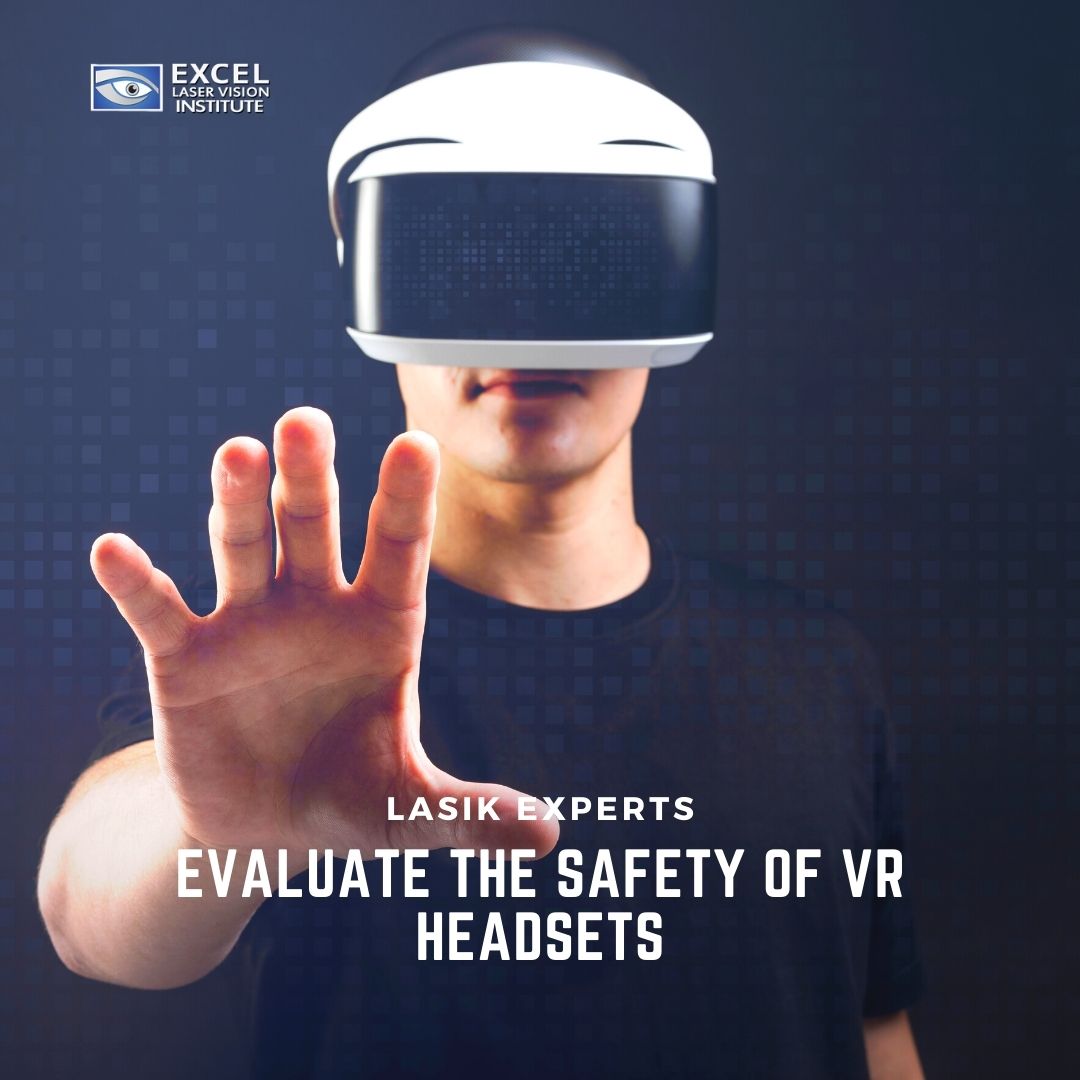
LASIK Experts Evaluate the Safety of VR Headsets
LASIK experts in Orange County such as those at Excel Laser Vision Institute have observed that, with more time inside, people have been increasing their daily screen time. All day, people are working from home on their computer or laptop and then taking breaks by looking at their phone or watching TV. We live in a world of screens. For many people, it’s their main source of productivity and entertainment. It’s no wonder that our screens are getting more and more technologically complex. The invention of virtual reality (VR) headsets is proof of this.
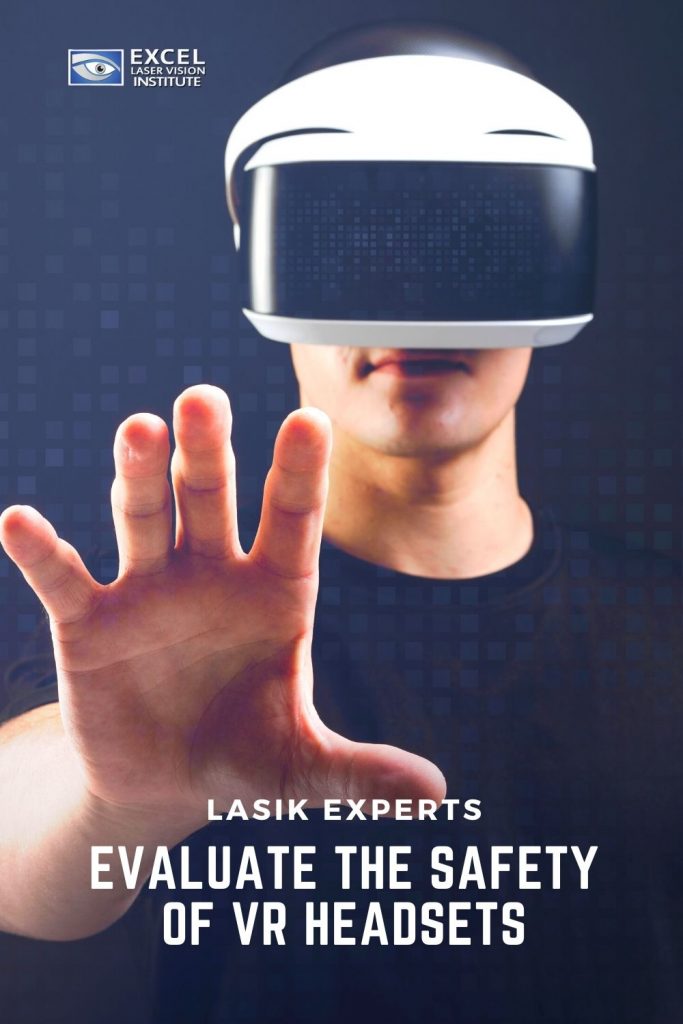
According to Doctor Moosa, a LASIK surgeon in Orange County, too much screen time can be hard on our eyes. It can cause eye strain, fatigue, and dry eye. This is the main reason why eye doctors will recommend taking regular breaks and blinking often when using a digital device. So, how does this translate to VR headsets? Virtual reality has been around for a long time but it has become a commercial success only recently. Since 2020 began, about 71% of Americans started using VR headsets more. As a more immersive digital device, some consumers are wondering if VR is more damaging to our vision than our normal screens. Will everybody be needing LASIK eye surgery after consistently playing with virtual reality? The answer is not cut and dried.
VR headsets can simulate a 360 degree experience that immerses the user in a new world. Instead of looking at a flat screen, the user wears goggles that are constructed with different displays. Each display is given a separate video feed that seamlessly transitions into the next. This presents the illusion of being in a new, 3D environment. Virtual reality can offer a fun, interactive experience for working out, gaming, or simulating adventure. However, it can also affect our bodies. Some users report feeling overwhelmed and nauseous by the VR perspective. This is known as cybersickness.
In terms of affecting vision, Orange County LASIK experts say that VR does not pose a significant danger to our eye health. However, like anything, it requires moderation. VR participants may experience digital eye strain because of decreased blinking. This can lead to dry eye and fatigue, much like with normal screens. The best way to avoid these symptoms is to take frequent breaks and focus our eyes on things in the real world.
Another thing to keep in mind with VR headsets is that they can affect people with strabismus (wandering eye) or amblyopia (lazy eye). With these conditions, the 3D effects of virtual reality may not be as striking. Plus, using VR with these conditions may lead to greater eye fatigue due to the lack of depth perception. Users who wear glasses may also run into some issues when using VR headsets. Not all headsets are built to accommodate glasses and thus may be uncomfortable for the user. Unfortunately, VR has not been constructed to accommodate the user’s vision needs. So, if they are nearsighted, farsighted, or have astigmatism, they are still required to wear their prescription to enjoy the experience.
If you have a refractive error and would like to enjoy VR without contacts or glasses, then schedule a consultation at Excel Laser Vision Institute. We can discuss laser eye surgery, one of the most innovative vision correction alternatives on the market. Achieve your vision goals with us today!
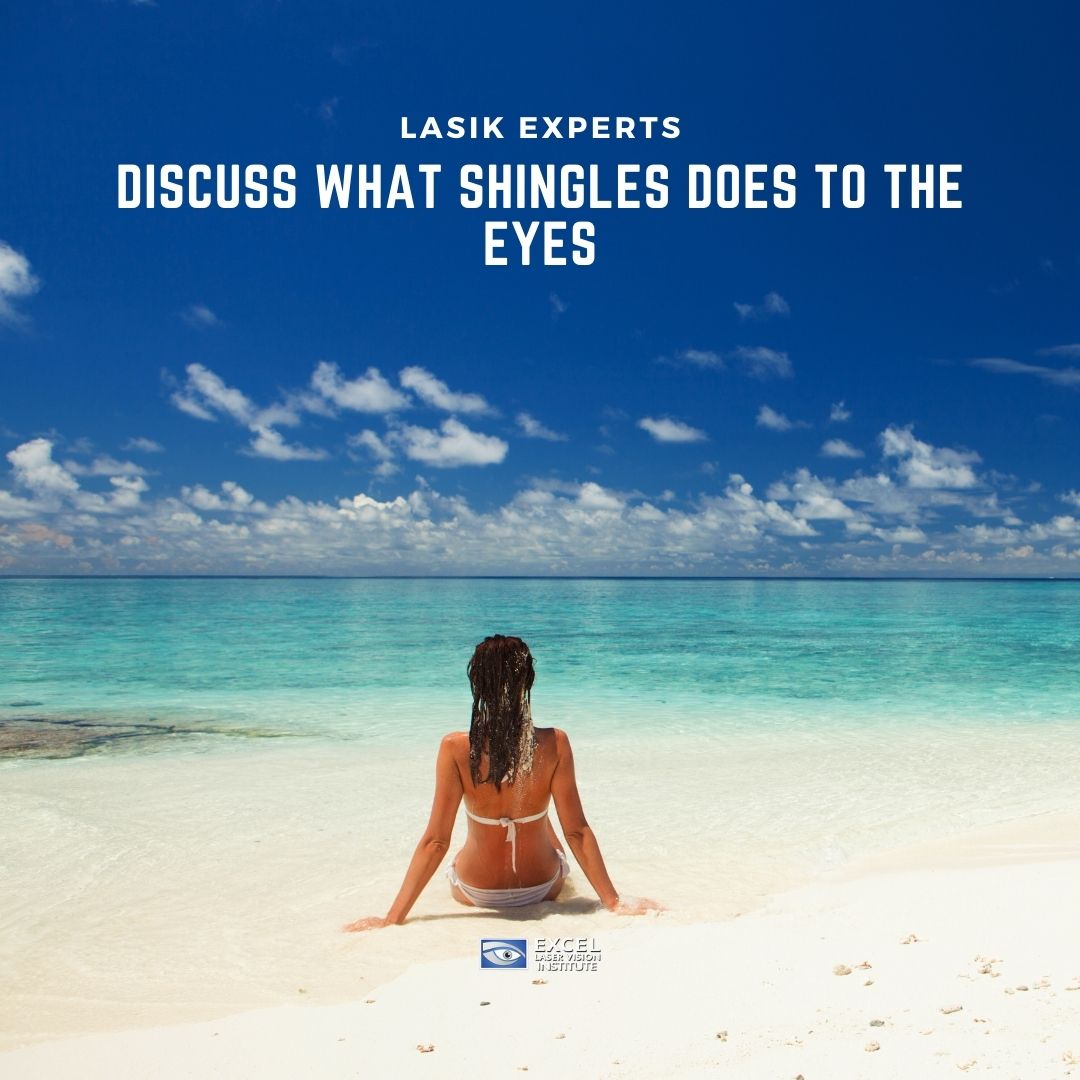
LASIK Experts Discuss What Shingles Does to the Eyes
Some of us may be familiar with the viral infection known as shingles. It’s often referred to as “chickenpox for adults.” However, many people don’t know that shingles (otherwise known as herpes zoster) can affect eye health. According to LASIK experts in Orange County, the viral infection can lead to eye problems such as cataracts, glaucoma, and scarring of the cornea.
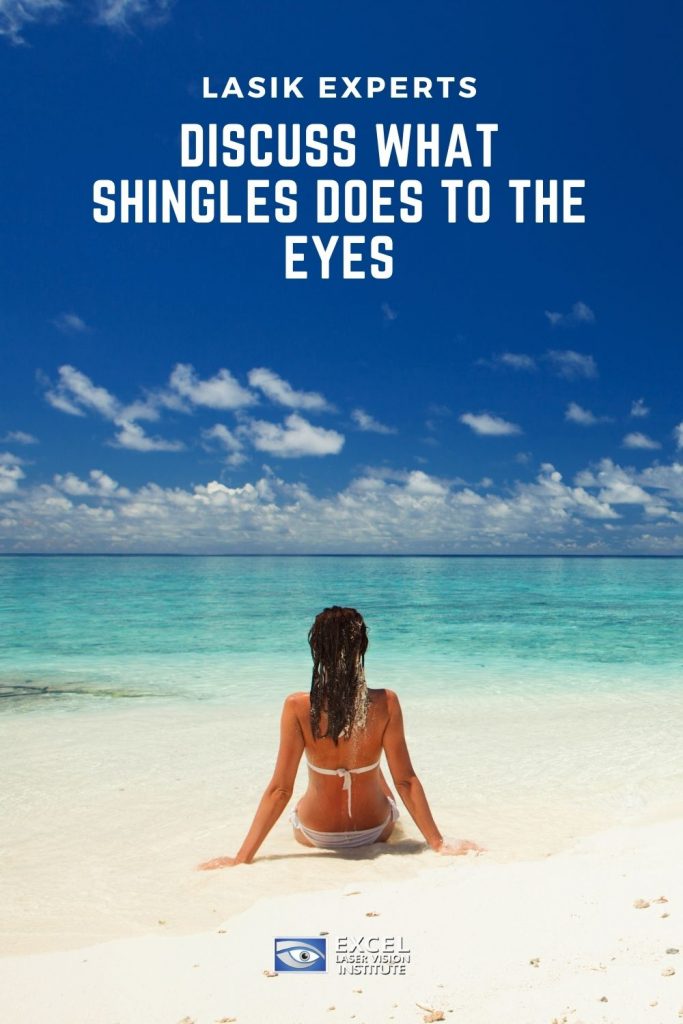
The reason that shingles is likened to chickenpox is because both infections are caused by the varicella-zoster virus. This virus can actually remain dormant in a person’s body. If, for example, someone had and recovered from chickenpox as a child, then that virus may be reactivated as shingles later in life. Experts who perform laser eye surgery in Orange County say that shingles affects about 1 in 3 Americans each year.
For the most part, shingles affects people later in life. Usually, after age 50. Medical experts believe that the natural decline in a person’s immune system is one of the reasons the virus becomes activated. When your immune system weakens over time, it may not be able to recognize certain viruses or know how to attack them. Other conditions that affect your chances of developing shingles include auto-immune diseases, HIV, and cancer. If you are taking steroids, transplant medications, or chemotherapy drugs, you may also be susceptible to the virus.
Shingles manifests in a variety of ways. Here are some of the most common symptoms that you might notice:
- Burning, tingling, or numb skin
- Skin sensitivity
- Painful rashes
- Fever and chills
- Headache
- Fatigue
- Upset stomach
- Fluid-filled blisters
- Mild itching
According to Doctor Moosa, a LASIK surgeon in Orange County, 10-20% of people who get shingles can also develop ophthalmic herpes zoster, which is shingles around the eyes. This can lead to cataracts, corneal scarring, glaucoma, and vision loss. If left untreated, the virus can affect the nerves of the eye, causing symptoms such as:
- Dry eye
- Blurry vision
- Redness/rashes in and around the eye
- Face tingling
- Pink eye
- Throbbing pain
- Light sensitivity
- Optic nerve swelling
Fortunately, there are some treatments available to those with ophthalmic herpes zoster. Antiviral medications may be given within the first 72 hours of a patient showing symptoms. Numbing medicine or cream may help relieve uncomfortable symptoms. Painkillers may also be given to relieve the patient, although they will not stop the infection itself. Hydrating eye drops, cooling compresses, and anti-bacterial eye drops will help target symptoms affecting the eye.
If shingles have affected your eyes, then you may require procedures such as cataract surgery from a LASIK clinic. Be sure to contact your eye doctor in Orange County such as Doctor Moosa immediately after noticing symptoms. The eyes are a sensitive part of the body, which means that they require excellent care and attention. The effects of shingles may last a long time if your eyes are having a hard time healing. Follow the care routine set in place by your doctor and schedule regular checkups to track your progress. Shingles typically last 2-4 weeks and, while it is possible to get it more than once, most people don’t.
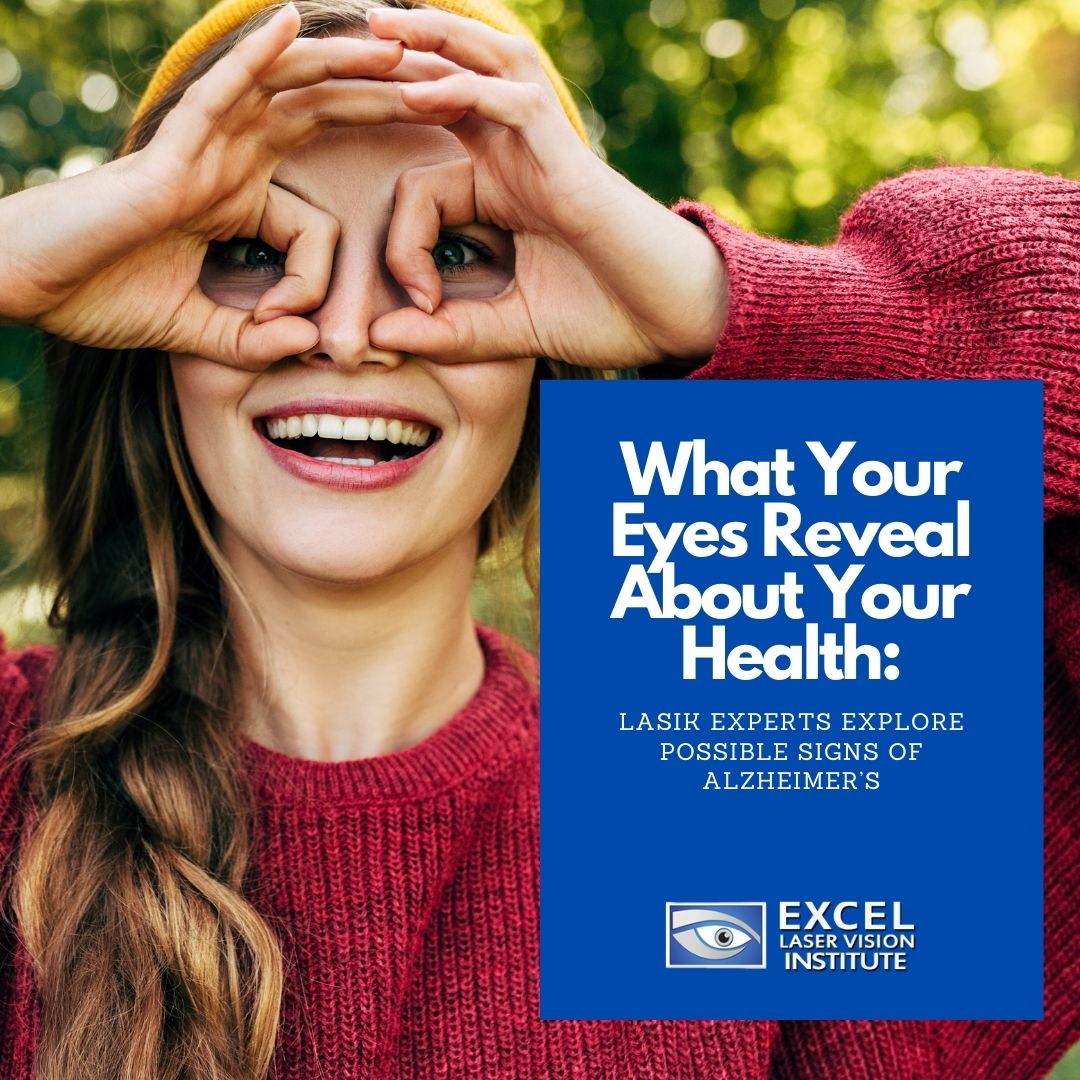
What Your Eyes Reveal About Your Health: LASIK Experts in Orange County Explore Possible Signs of Alzheimer’s
Can our eyes predict our overall health? This is the question that many ophthalmologists are asking now that new studies have shown a perceptible link between brain health and retinal changes. Eye examinations have long been important for detecting ocular diseases like glaucoma and macular degeneration but according to Doctor Moosa, one of the top ten LASIK experts in Orange County, our eyes may be able to tell us more about our overall health.
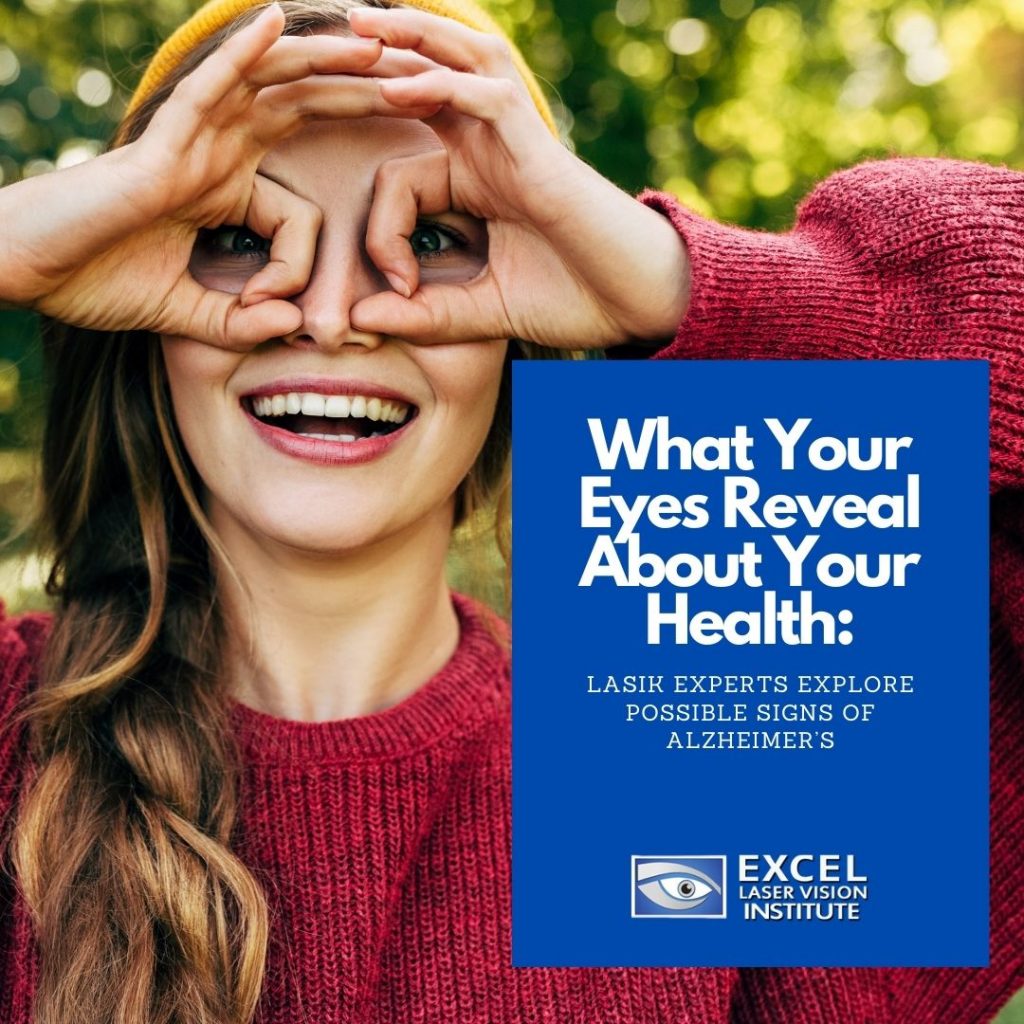
For decades, medical professionals have been using fundus exams, which examine the back of your eye, to discover early signs of diabetes, heart disease, and cancerous tumors. These examinations focus on the nerve cells and blood vessels in the retina in order to gather greater information about bodily health. Everything in our body is connected to or reliant on another part, which is why it makes sense that our eye health would affect or reflect other aspects of our physical functioning.
Laser eye surgery clinics in Orange County specifically Excel Laser Vision Institute have been following a recent study in the U.K. which hypothesizes a link between retinal changes and Alzheimer’s disease. For the study, researchers conducted retinal scans on one hundred and twenty subjects, all considered to be elderly. In twenty-five percent of the subjects with Alzheimer’s disease, researchers found yellow deposits of calcium and fat in their eye examinations. Only four percent of subjects without Alzheimer’s displayed this same symptom.
Calcium and fat deposits behind the eye, otherwise known as hard drusen, are signs of oxidative stress. This means that there is an imbalance between antioxidant defenses and free radicals in the body. While this does not pose a threat to vision, it does suggest a risk of developing Alzheimer’s disease. If you speak to a LASIK surgeon about oxidative stress, you will learn that this condition often implicates other health concerns like high blood pressure, heart disease, diabetes, atherosclerosis, inflammatory issues, cancer, and Parkinson’s disease.
While following this U.K. study, LASIK clinics in Orange County specifically Excel Laser Vision Institute learned that the patients with Alzheimer’s also tended to reveal thicker blood vessels in their examinations, which suggests that they had poor circulation and blood flow. This is a known risk factor of Alzheimer’s and plays a large role in memory loss. This study has shown that there may be more ways to detect early signs of Alzheimer’s and perhaps even prevent it from developing in certain individuals. Currently, there is no one, conclusive test to diagnose Alzheimer’s. However, this study provides a greater range of knowledge and tools to help fight against it.
Since our eyes do so much for our day-to-day and reveal much about our health, it is important to have yearly eye exams in order to monitor their progress. Search “LASIK surgeons near me” to find a clinic where you can schedule a full examination and consultation about your vision needs. LASIK eye surgery is known to treat refractive errors such as astigmatism, nearsightedness, and farsightedness. Many patients are even able to achieve 20/20 vision or better. Say goodbye to glasses and contacts and hello to clear vision!
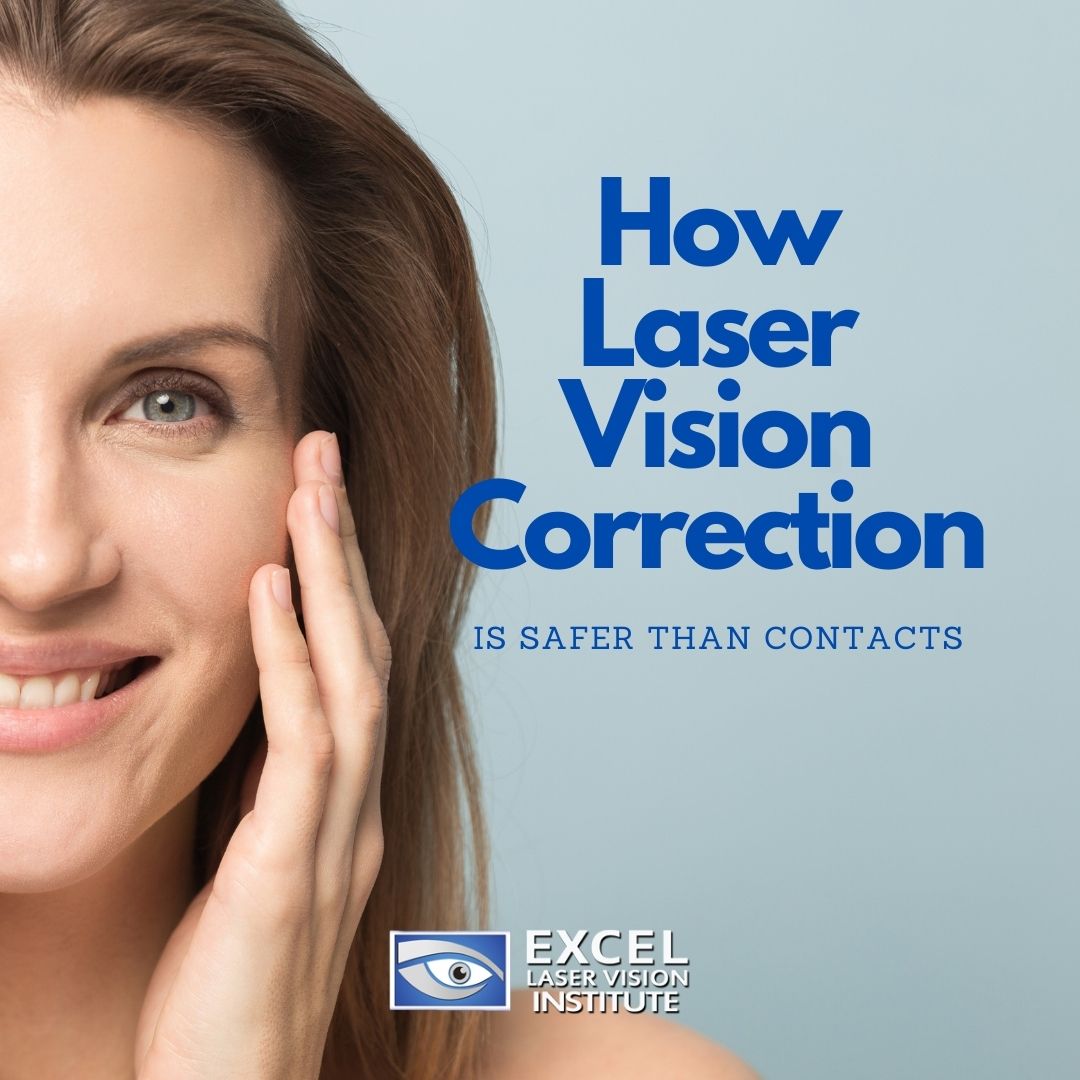
How Laser Vision Correction is Safer Than Contacts
For many people, wearing glasses is an inconvenience, but they require some form of vision correction to be able to go about their daily lives. This is when many people will switch to contact lenses. However, according to LASIK experts in Orange County like Doctor Moosa, the safety risks that come with regular contact use are actually greater than undergoing laser eye surgery to correct vision long-term.
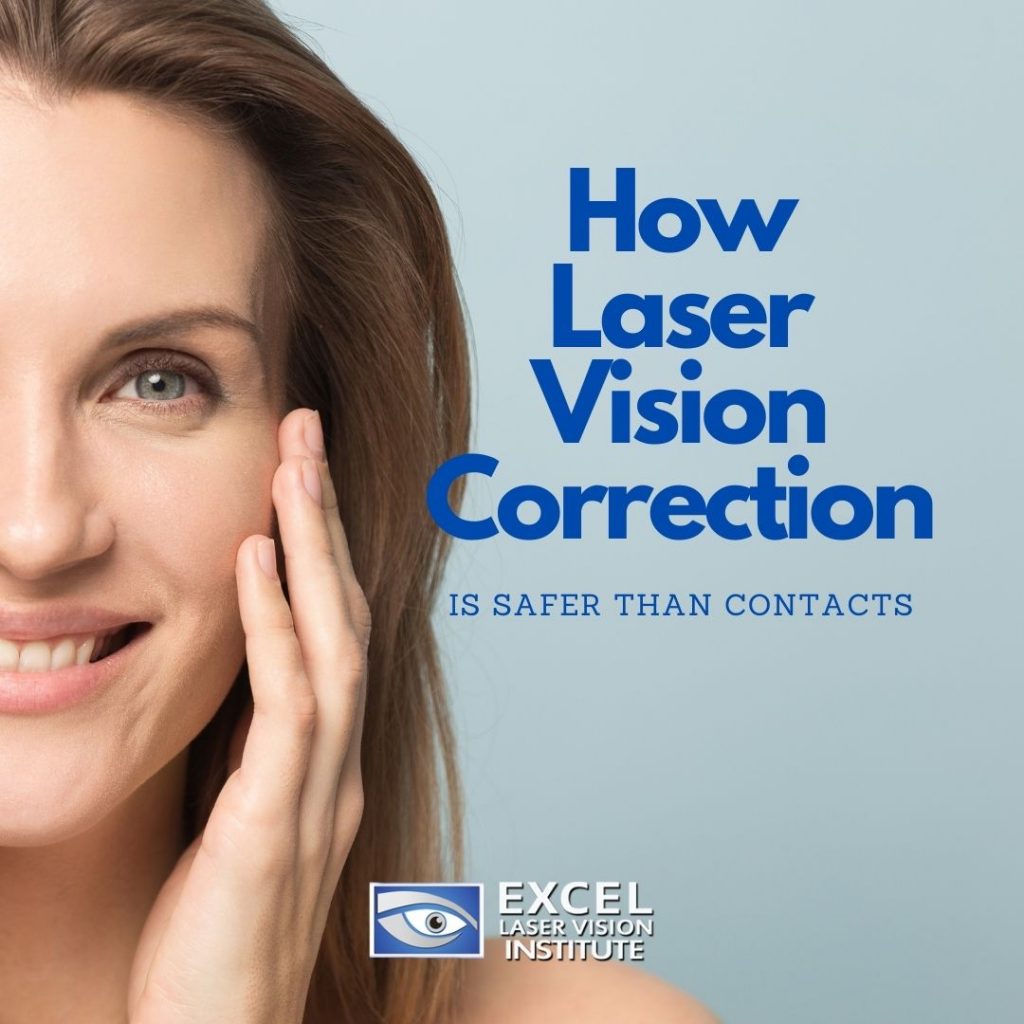
The reason that LASIK is recommended over contact lenses is that, once performed, laser vision correction requires no maintenance. Contacts, however, must be continuously applied, removed, cleaned, and so on. According to Doctor Moosa, one of the best LASIK surgeon in Orange County, those who wear contacts risk developing an infection from constant hand-eye contact. Recent studies show that 40-90% of contact lens wearers don’t follow proper care directions. One reason for this is that people lead busy lives and often forget to maintain their contacts as they should. This can have drastic impacts on a person’s ocular health. Here are some of the ways you risk infection when wearing contacts:
- Touching eyes with contact solution bottles
- Touching eyes with unwashed hands
- Improperly disinfecting lenses
- Storing lenses wrong
- Wearing contacts too long
Even when following proper care instructions, contact wearers cannot completely eliminate the risk of infection. Contact-related infections can arise as a result of microbes in your tears, your immune system, and hygiene habits. In many ways, getting laser eye surgery from a clinic in Orange County can save you the trouble and worry of these risks.
LASIK Surgeons Near Me
When you visit a LASIK clinic in Orange County like Excel Laser Vision Institute, you will be given a comprehensive eye exam and consultation before you are determined to be eligible for laser eye surgery. This ensures that your procedure runs smoothly and you receive the best possible results to achieve your vision goals. LASIK surgeons have extensive training and certification in order to perform the procedure and they have state-of-the-art technology that ensures precision and safety. Most people who receive LASIK can achieve 20/20 vision or better and no longer have a need for wearing contacts or glasses. This significantly reduces the risk of eye infections or any other health complications as a result of eye contamination.
According to researchers, the complication rate for LASIK surgery rests at less than 1%. Laser eye surgery has a long history of practice and a high satisfaction rate among patients. This refractive surgery is also more affordable than ever with available financing packages and promotions at certain clinics. Now that LASIK is more readily available, more people are able to enjoy its benefits. LASIK allows greater freedom for those with a busy lifestyle or who seek to participate in active careers and hobbies. Whether you’re tired of your contacts or you just want to live a more spontaneous life, laser eye surgery can help you achieve those goals.
If you are interested in LASIK, you can schedule an appointment at the Excel Laser Vision Institute, one of the best laser eye surgery clinics in the Orange County and Los Angeles area. With a team of experienced staff and a Harvard-trained surgeon, you will receive the most care and attention possible. Start your LASIK journey today and achieve your vision goals!
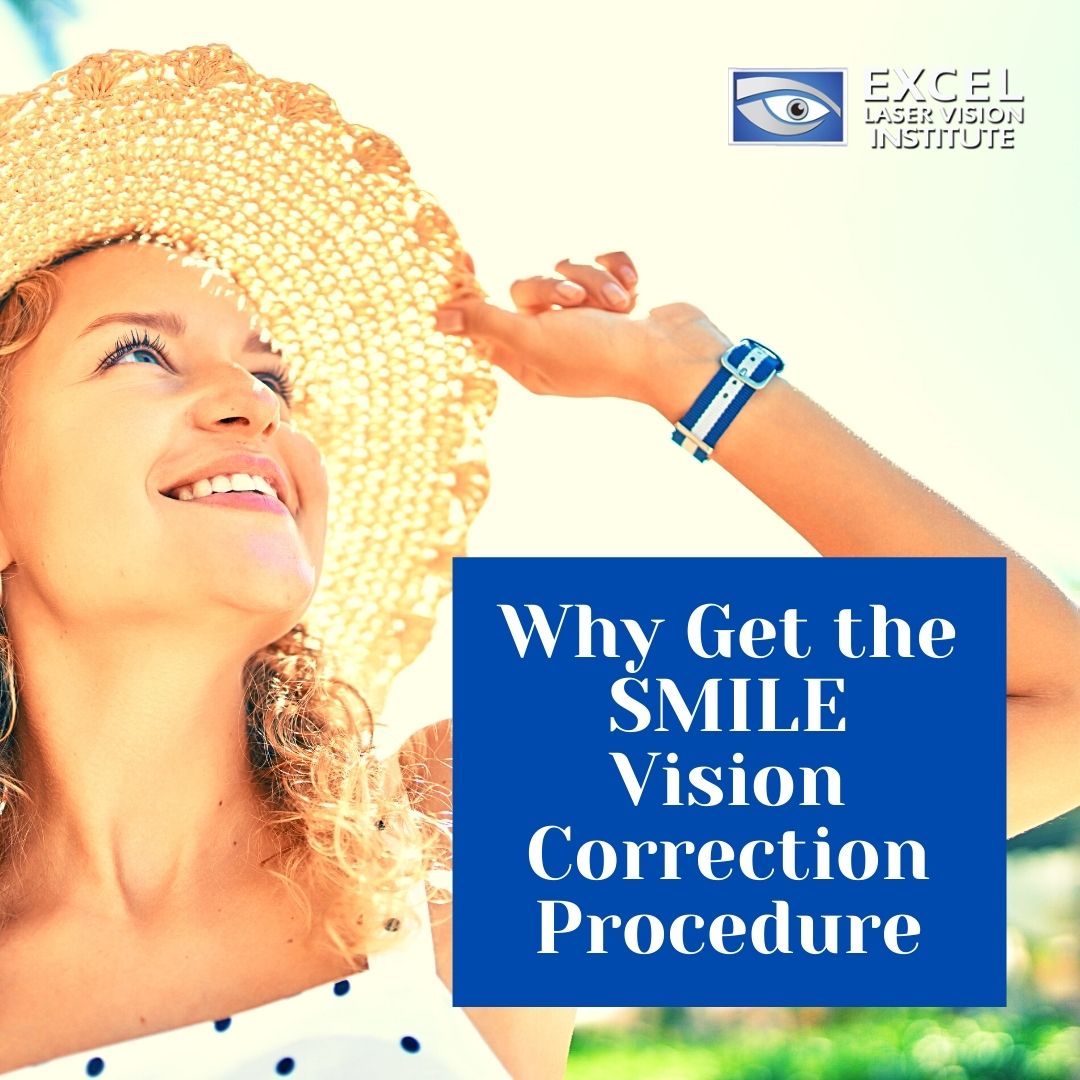
Why Get the SMILE Vision Correction Procedure?
Many people don’t realize that LASIK clinics in Orange County like Excel Laser Vision Institute can offer more than the standard LASIK procedure to qualified patients. In fact, there are quite a few alternatives that can produce the same long-term results and may even suit a patient better than traditional LASIK. Below, Dr. Moosa, a Harvard-trained surgeon at the Excel Laser Vision Institute, discusses some of the choices that patients have to improve visual acuity:
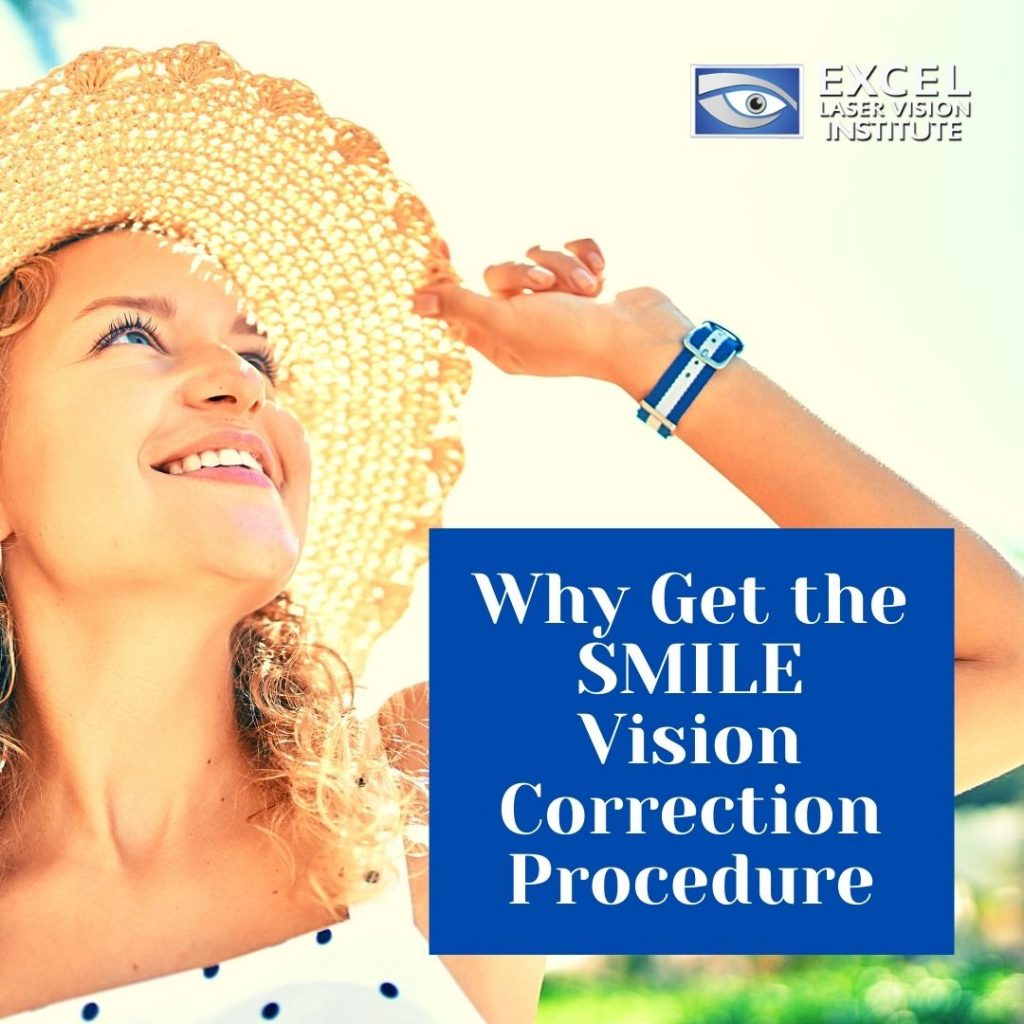
Out of these corrective procedures, SMILE is the newest innovation in laser vision technology. According to Doctor Moosa, a LASIK surgeon in Orange County, SMILE stands for small-incision lenticule extraction. Much like LASIK or PRK, SMILE is a refractive surgery that can significantly increase your clarity of vision and may even eliminate your need for contacts or glasses entirely.
The method for SMILE eye surgery is very similar to LASIK in that its goal is to reshape the eye in order to allow for light to focus better. However, it can achieve this without the surgical creation of a corneal flap. When performing SMILE, eye doctors remove excess tissue through a tiny incision rather than making a flap. This option is ideal for patients with more sensitive eye conditions and therefore would benefit from a no-flap laser eye surgery. Recovery from a SMILE procedure has the potential to be quicker and more efficient, according to a patient’s lifestyle. For those at risk of future injuries (i.e. athletes), SMILE may reduce the chances of complications in the case that the eye is damaged.
Recent studies have shown that 99% of SMILE patients achieve 20/40 vision or better within six months and 88% of people acquire 20/20 vision at the six-month mark. SMILE specializes in correcting myopia (nearsightedness) between -1 and -8 diopters. An eye care professional at a LASIK clinic can assess your eye health in order to determine if you qualify for the procedure.
At your eye exam, the eye care expert will examine the size of your pupils, the thickness of your cornea, measure your visual acuity, and discuss your eye health history. This is a good time to discuss LASIK, PRK, and SMILE as your vision correction options. Once you decide on the best alternative to achieve your vision goals, the surgeon will walk you through what you can expect on the day of the procedure as well as after-care. SMILE procedures are over in a matter of minutes and most patients experience no pain or discomfort at all. Eye drops are often prescribed in order to prevent any swelling and discomfort after the surgery.
SMILE is a proven alternative to LASIK that can offer the same benefits to patients in need. For many people that do not qualify for LASIK or PRK, SMILE may actually be a viable alternative to achieve one’s vision goals. In terms of cost, it is comparable to LASIK at around $2,000 an eye. If you are interested in learning more about this procedure, then you should call the Excel Laser Vision Institute. Once you make an appointment for an eye exam, an eye care professional will be able to tell you if you qualify for this vision correction procedure.
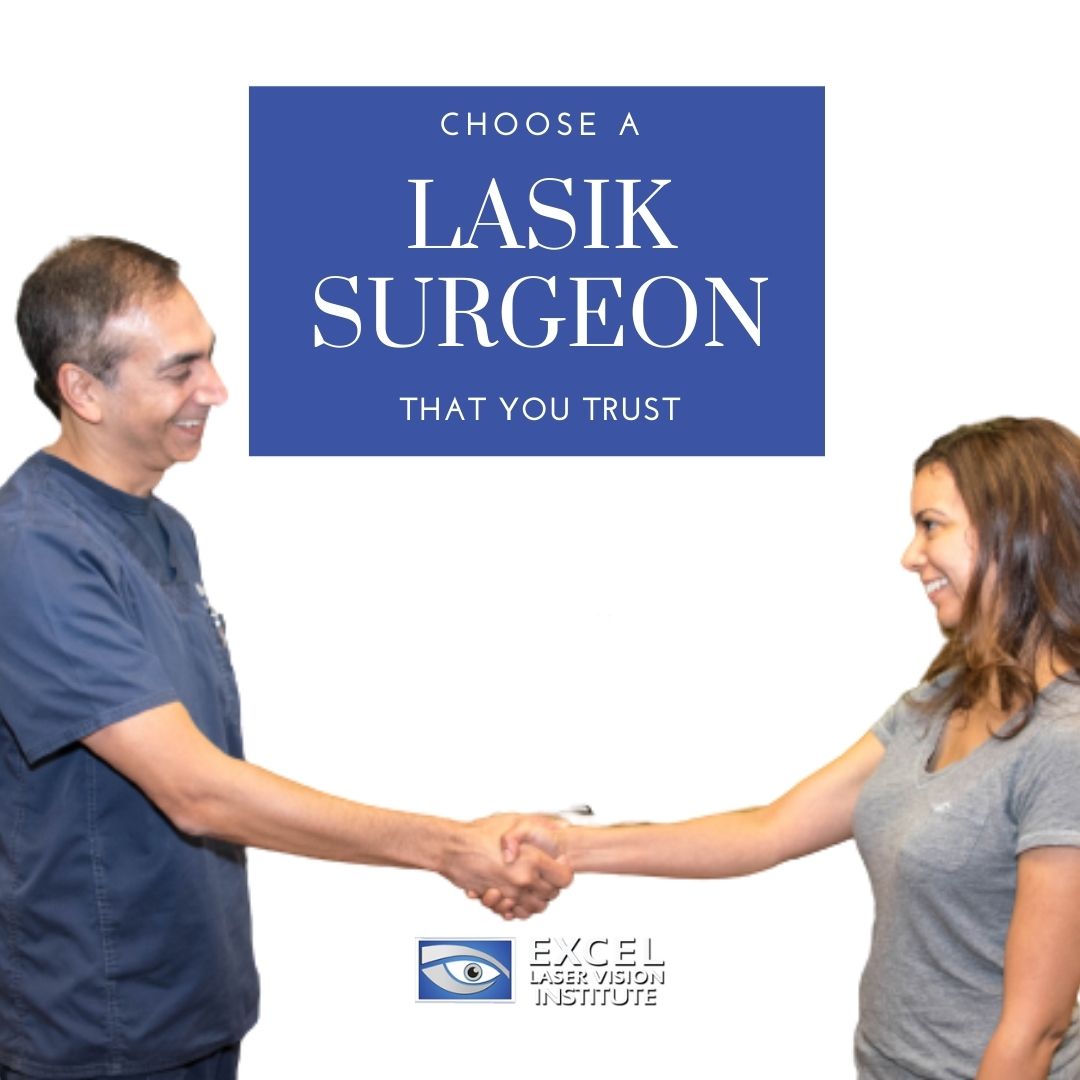
Choose a LASIK Surgeon That You Trust
Laser eye surgery has become increasingly accessible to people with varying degrees of vision problems, thanks to innovations in eye correction procedures and methods. Patients can visit a LASIK clinic like Excel Laser Vision Institute in order to treat astigmatism, farsightedness, and nearsightedness as well as achieve 20/20 vision or better. However, this life-changing procedure would be nothing without the dedicated ophthalmologists that have acquired the skill and experience to perform the surgery. At clinics like Excel Laser Vision Institute, there is one surgeon who attends to every individual patient. Dr. Moosa describes the kind of personalized care that he can give at this eye center:
Typically, vision problems occur as the shape of the lens starts to alter over time. This challenges the eye’s focusing capacity and causes blurriness. The reason that so many people consider laser eye surgery is because it provides them with clarity of vision that isn’t dependent on contacts and glasses. LASIK patients affirm the fact that the surgery is brief, painless, with a quick recovery. Most people are able to return to work and driving the next day. The LASIK surgeon plays a large role in the success of each procedure as well as the long-term results. This is why it is so important for patients to choose an ophthalmologist that is in the top tier of their field. As laser technology continues to advance and become more customizable, ophthalmologists must adapt to new methods and strategies that will best fit each patient.
There are some actionable steps that every patient can take in order to find the right surgeon for their laser eye surgery. The FDA has their own recommendations based on their knowledge of the industry. Here is their advice to prospective LASIK patients:
Know your surgeon’s background.
You can compare surgeons based on their level of experience and reputation in the field. One of the best ways to vet a LASIK surgeon is to look at patient reviews and testimonials. If they have served a wide range of patients with excellent results, then they are a good option for you.
See what they promise.
LASIK has a history of improving the visual acuity of patients with many different prescriptions. However, it is not a miracle-worker. Every prospective patient at Excel Laser Vision Institute, a LASIK clinic in Orange County, must be properly evaluated for their eye condition and overall health. If a LASIK surgeon promises you the world without a proper test and consultation, then they are acting as a salesman instead of a doctor.
Ask about the technology they are using.
A good LASIK surgeon will be able to walk you through the laser eye surgery process in a comprehensive manner. This includes informing you about the machines that they are using. If they are utilizing the newest technology, then they have the best resources under their belt to deliver more accurate results.
When beginning your LASIK journey, you should have a surgeon that you can trust. Ophthalmologists can make or break your experience with laser eye surgery. That’s why it’s so important to do your research and ensure that your LASIK surgeon is the right fit for you. This will not only make you more comfortable as you undergo the life-changing process but it will also improve the accuracy of the procedure and strengthen the long-term results. Call or visit Excel Laser Vision Institute’s Orange County branch to learn how you can get started on achieving your vision goals!
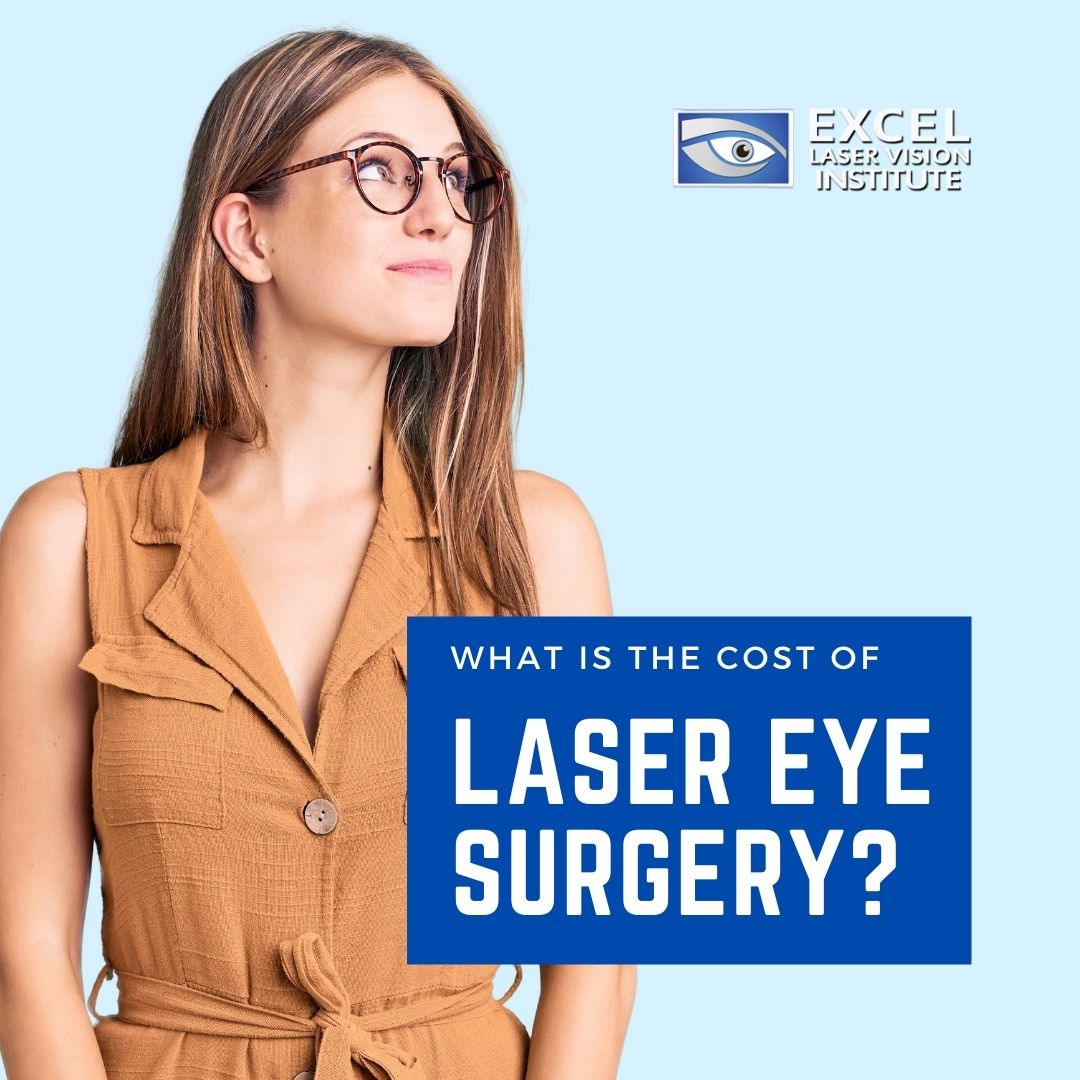
What Is the Cost of Laser Eye Surgery?
As an elective surgery with one of the highest patient satisfaction rates, LASIK is drawing much-deserved attention from people all over the world. The speed and precision with which a LASIK surgeon in Orange County can perform a life-changing procedure is groundbreaking. However, many people are intimidated by the incredible nature of this surgery and immediately assume that it is out of their price range.
Sign-up For A Free Consultation
While LASIK is certainly an investment, many people don’t realize that, in this day and age, laser vision correction is more affordable than ever. With countless financing plans that offer no down payments, no interest, and extended payment periods, LASIK is quickly becoming accessible to various income levels.
If you ask a LASIK clinic in Orange County like Excel laser Vision Institute what they charge for LASIK, you may hear estimates that range from $1,000 to $3,000 per eye. The price will depend on many external factors including the clinic, the surgeon, the access to resources, and the individual prescription of the patient. Financing options allow patients to control their out-of-pocket costs and manage a payment timeline.
The total cost of laser eye surgery reflects the attentive nature of the clinic, the quality of the laser equipment, and the experience of the LASIK surgeon in Orange County. These are the services that make up the total cost:
- Pre-surgery appointments
- Eye surgery and medications
- Post-operative appointments
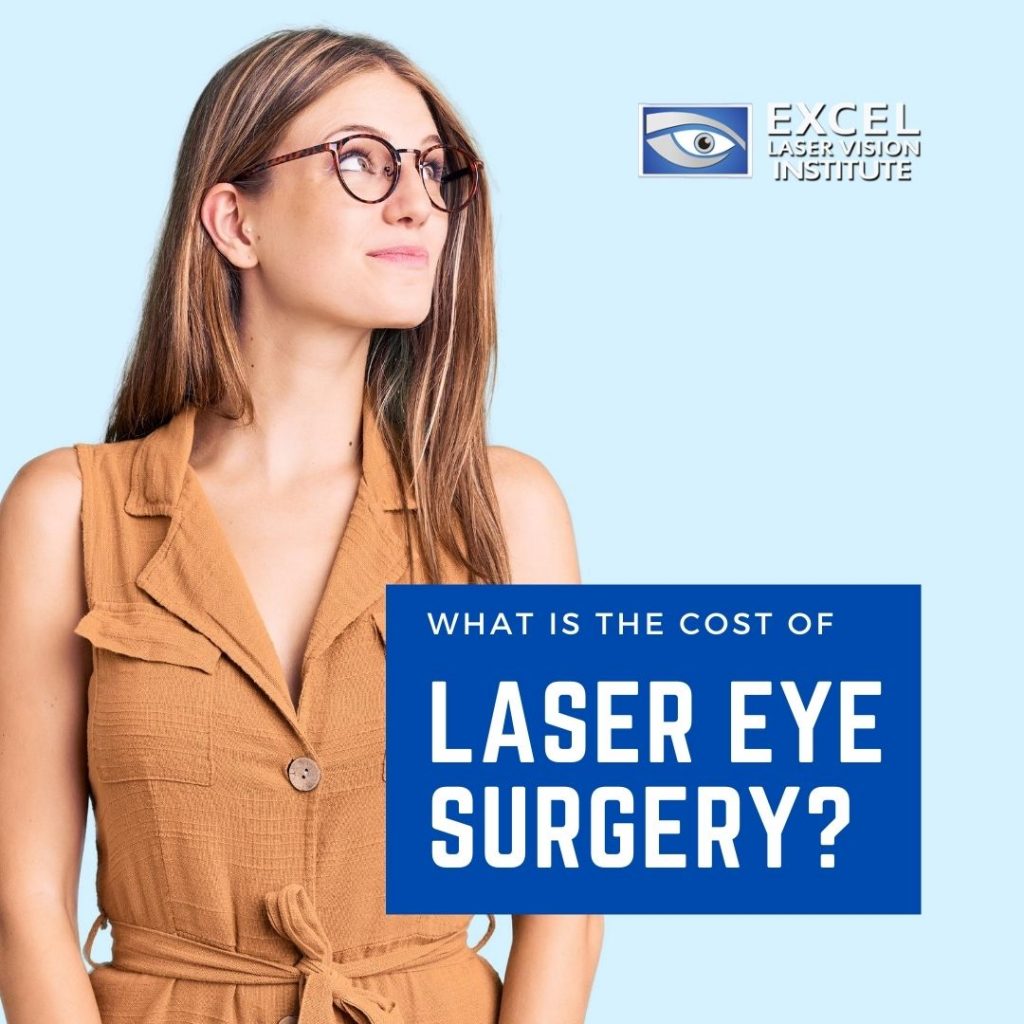
The right LASIK clinic in Orange County will guide you through every step of the laser vision correction process and make sure that you understand what you are paying for. If you are confused about any aspect of the bill, you can ask for a detailed breakdown of each fee as it relates to your individual surgery.
You will hear many people say that LASIK is an investment. This means that you might have to pay a little more upfront, but you will experience a great deal of value over a lifetime. As a long-term solution, laser vision correction costs are comparable to wearing and maintaining glasses and contacts. Consider how much you spend normally on replacing your frames, contacts, buying contact solution, and getting prescription sunglasses each year. With temporary corrective lenses, the price can significantly accumulate over the years.
The value that you gain from laser eye surgery is even more than economic. There are countless stories of people who were able to follow their chosen career paths and passions because of the clear, independent vision that LASIK afforded them. Inspiring photographers, firefighters, athletes, and pilots are just some of the people who can achieve their dreams through laser vision correction. Advanced precision technology has also allowed LASIK to become safer and more customizable than ever.
Now that LASIK is a more affordable vision correction option, more people are able to achieve their vision goals. If you desire independence from corrective lenses, then laser eye surgery may be the right solution for you. Visit a LASIK clinic for a comprehensive exam and consultation with an eye care professional to see if you would be a good candidate for the procedure.
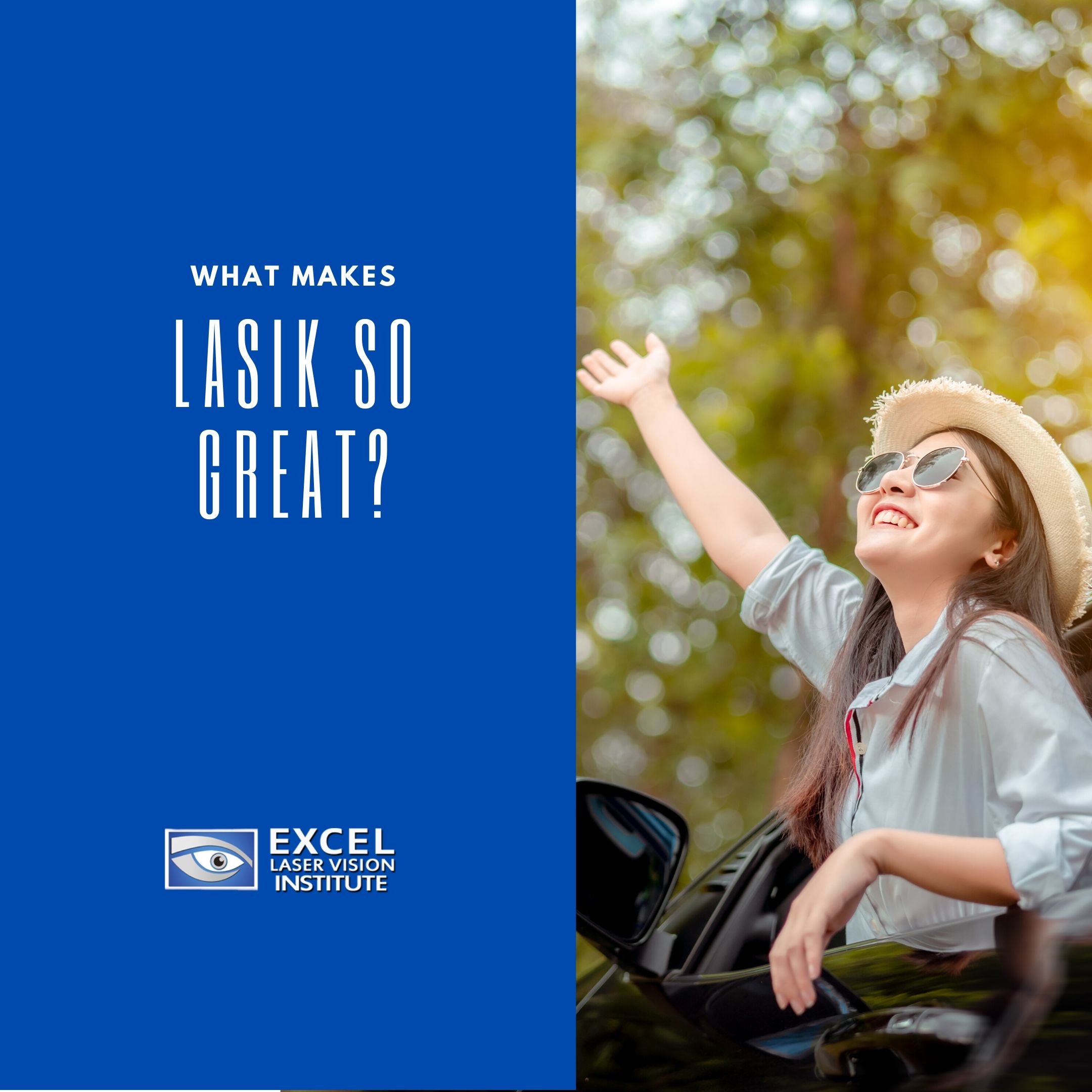
What Makes LASIK So Great?
Over 75 percent of adults in the U.S. need prescription eyewear to correct their vision, which is why LASIK surgeons like Doctor Moosa are starting to see more prospective patients at LASIK clinics. More and more people are realizing the advantages of getting laser eye surgery to treat vision problems, especially since 90% of people over the age of 55 can’t see without prescription glasses or contacts.
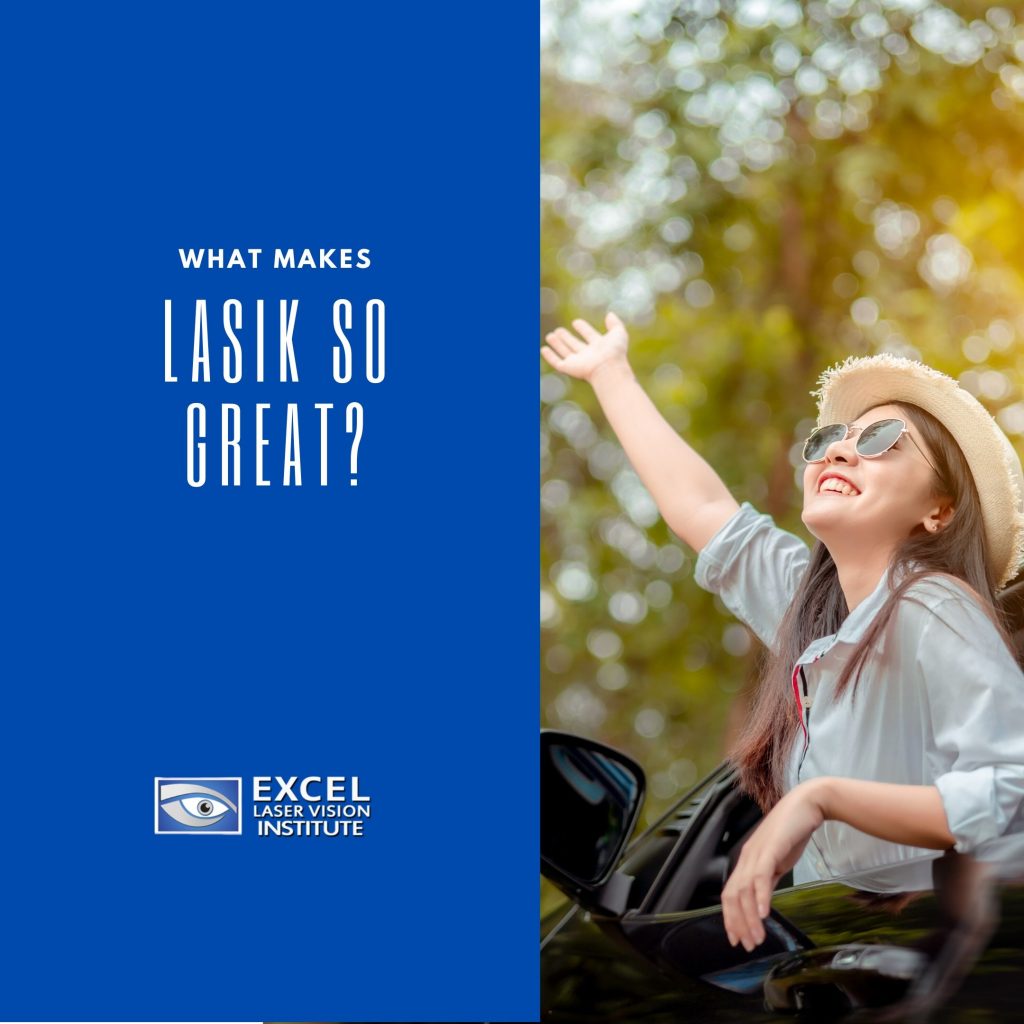
LASIK surgery became FDA approved in 1996 and, ever since then, its technology and methods have improved to provide greater accuracy and long-lasting results to patients around the country. The procedure works by utilizing computer-guided lasers to eliminate excess eye tissue and reshape the cornea. People with various prescriptions and vision problems are able to have the procedure done because the technology is so customizable. LASIK professionals perform an in-depth pre-surgery examination and analysis of a patient’s eyes in order to plan for and execute the best techniques.
LASIK clinics can offer treatment for nearsightedness, farsightedness, and astigmatism. For a majority of LASIK patients, vision improvement is immediate with a measured visual acuity of 20/40, 20/20, or better. Many patients who undergo LASIK corrective eye surgery no longer need to rely on their contacts or glasses after the procedure.
According to Doctor Moosa, a LASIK surgeon in Orange County, laser eye surgery is painless and finished in a matter of minutes. Thanks to advanced laser machinery, numbing eye drop solutions, and proven techniques, LASIK is an elective surgery with one of the highest patient satisfaction rates. Most LASIK patients experience almost immediate results with a fast recovery period and minimal postsurgery symptoms. When preparing for LASIK surgery, most patients are asked to have a designated driver and to dress comfortably. However, many individuals are able to get back to work and their normal routine within a day or two after their surgery. Optimal visual acuity may take some time to fully settle in but most patients find that the timeline is quicker than they expected.
LASIK is a long-term vision correction solution that aims to improve an individual’s quality of life by providing crystal clear vision without restraints. In the case where your eyes start to change again later in life, you may qualify for a LASIK adjustment. However, for the most part, laser eye surgery is designed to last. This is why so many people consider it to be a valuable investment. Instead of the yearly micro expenses and inconveniences that come with glasses or contacts, LASIK provides consistent, independent vision clarity without the need for prescription lenses. Imagine waking up in the morning and not having to reach for prescription eyewear to see that it’s a beautiful day outside your window.
LASIK promotes an active and sometimes spontaneous lifestyle for people that no longer want to be tied down by their vision needs. When you are out in the elements, whether it’s for recreation or for work, you want to be able to rely on your eyesight without the hazards of glasses or contacts. Many people turn to LASIK when it benefits their career goals or their hobbies. Laser eye surgery can help you chase your passions without any restraints.

Learn What to Expect from Your Eyes as You Get Older
According to Doctor Moosa, a LASIK surgeon in Orange County, our eyes can deteriorate even if we maintain 20/20 vision for most of our lives. In fact, it is quite common for people to develop vision problems after turning forty. Yearly eye exams become increasingly important as you age, especially to monitor symptoms of glaucoma, macular degeneration, or cataracts. When these conditions are discovered early, patients increase their chances of maintaining strong, healthy eyes for a longer period of time.
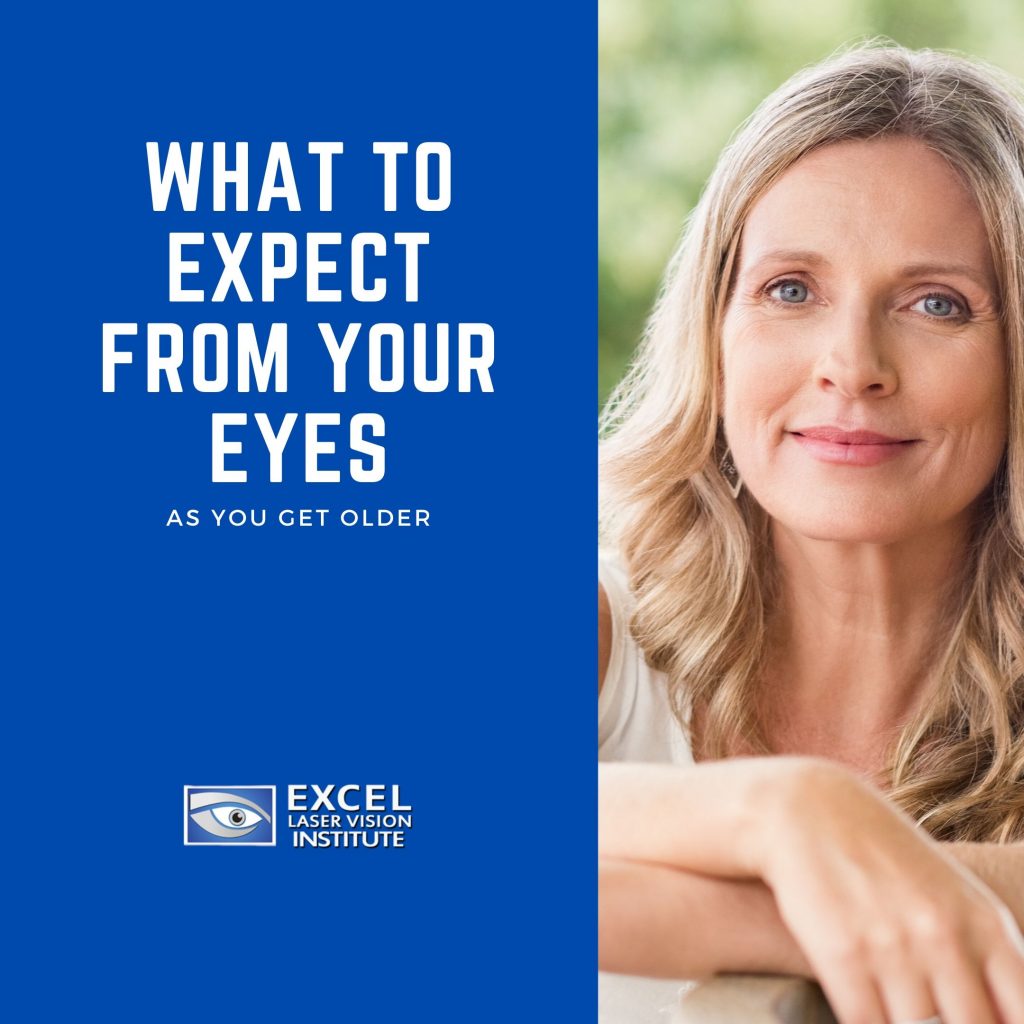
Eye care professionals at LASIK clinics such as Excel Laser Vision Institute explain that not all age-related issues threaten vision; however, they can be uncomfortable and inconvenient enough to affect someone’s quality of life. Here are some of the most common aging eye conditions that people experience after turning forty:
Dry Eye
According to eye care professionals, certain hormonal shifts that happen later in life can cause a person’s mucous membranes to dry out. For example, women can experience symptoms of dry eye in the years directly before and after menopause as estrogen and progesterone levels decrease. These symptoms can be exacerbated by dry climates and frequent screen time. When staring at a computer, you only blink half as often as normal, which causes eye strain and dryness.
The best way to combat dry eye symptoms is to use lubricating drops. You can schedule an appointment with an eye doctor and speak to them about dry eye to see if they can prescribe eye drops to relieve any redness, itchiness, burning, and discomfort. There are many over-the-counter solutions that will help with this condition as well. Another way to ease dry eye symptoms is to drink plenty of water, avoid alcohol, and incorporate food that is high in omega-3s into your diet.
Worsened Vision for Reading
Many eye care professionals encounter older patients that suddenly have a hard time reading. This is quite natural and normal since our eye lenses get less flexible as we age. The best way to combat this vision problem is to visit an eye doctor or a LASIK surgeon in Orange County such as Doctor Moosa. You may qualify for laser eye surgery or there may be another procedure to help restore your close-up vision.
Worsened Vision at Night
Just as individuals may have a harder time reading as they get older, they may also have trouble seeing at night. This is due to the natural deterioration of the eye’s photoreceptors. Many patients may notice this problem while driving at night. The fastest way to improve night vision is to update your prescription. For a more long-term solution, you may consider laser eye surgery to treat low-order and high-order aberrations.
Glaucoma
Aging eyes commonly experience glaucoma, which is a buildup of pressure that damages the optic nerve. This can lead to vision loss, starting with peripheral vision. Eye care professionals recommend attending yearly eye exams to test for this condition. When glaucoma is diagnosed early, it can be properly treated.
Cataracts
Since our eye lenses are made of protein and water, it is common for those proteins to start clumping together. This phenomenon can lead to cataracts. Clumped proteins cause cloudy, blurry vision and halos. Eye doctors recommend anti-glare sunglasses to halt cataracts from becoming worse. Cataracts can be discovered at yearly eye exams and monitored in case cataract surgery is needed.
Macular Degeneration
The macula is a part of the eye located behind the retina. It is composed of light-sensing cells that are responsible for central vision. Unfortunately, the macula layers can start to break and leak, which leads to blurry vision. Macular degeneration is natural in older individuals. However, it can be minimized with a healthy diet and regular eye exams.

How To Maintain Healthy Eyes
Nowadays, everyone is concerned about staying healthy. According to a LASIK surgeon in Orange County, our eyes deserve particular attention at this moment. In order to minimize the risk of infection and potential vision problems as a result of poor hygiene, everyone should follow certain guidelines that will maintain the integrity of healthy, well-functioning eyes.
While we prioritize our general health, we should remember that our eyes do so much to improve our productivity, convenience, and quality of life. Here are some of the best ways you can protect your eyes, according to a LASIK surgeon:
Wash Your Hands
The number one tip that you will hear from any Orange County LASIK clinic is to wash your hands! Infections like conjunctivitis (or pink eye) can be contracted as a result of skipping this critical practice. You should also avoid sharing makeup, eye drops, towels, and any other product that gets near your eye with other people. This will minimize the spread of bacteria.
Limit Your Screen Time
According to a recent study, Americans spend an average of over 10 hours a day looking at a screen, whether that’s a computer, smartphone, TV, or other digital devices. This can cause a lot of eye strain and lead to dryness, fatigue, blurred vision, and irritation. In order to relieve your eyes from constant screen activity, you can try taking little breaks. Most eye care professionals recommend the 20-20-20 rule, which is that after every 20 minutes spent on a device, you should look 20 feet away for at least 20 seconds to give your eyes a chance to refocus. If you need to be inside for work, try to adjust your lighting so that it’s not too harsh for your eyes. You might even consider investing in blue light blocking glasses to help minimize screen time symptoms.
Take Care of Contacts
If you wear contact lenses, then you’re aware of the eye infection risks that come with this method of eye correction. You should always wash your hands thoroughly before inserting, removing, or adjusting your contact lenses. Follow your eye doctor’s instructions for daily cleaning methods and replacement timelines for reusable lenses. If you have the disposable kind, then remove and discard your contacts after each wear. Remember to remove your contacts before bed and only use the prescribed solution for cleaning your contacts. Tap water contains microorganisms that can attach to your lenses and cause infections.
Avoid Smoking
Many people are not aware that smoking can lead to macular degeneration, cataracts, dry eye, and uveitis. Recent statistics have shown that smokers are four times more likely than nonsmokers to experience blindness in old age.
Eat a Balanced Diet
In order to fortify your eye strength and vision, you should consume foods that are rich in vitamin A, vitamin C, calcium, and zinc. Try to incorporate vegetables like spinach, kale, and carrots in your diet. Salmon, apricots, and sweet potatoes are also good for your eyes.
Wear Sunglasses
One of the simplest things that you can do to protect your eyes is wear sunglasses! Harmful UV rays and radiation can cause cataracts and macular degeneration later in life. Make sure that your sunglasses offer full protection with UV400 or 100% UV protection written on the label.
It is so important to maintain good eye hygiene. Eyes are sensitive and valuable in our everyday lives. Serious inflammation and corneal infections can result in corneal scarring or even vision loss. So, in an effort to protect our bodies and our minds, everyone could practice better eye hygiene for a healthier, happier life.

